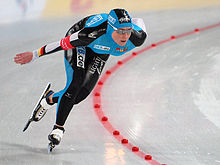 In this blog, we have dealt with sports arbitration in general, and the Munich Pechstein case in particular, on several occasions. This week, the most recent issue of the German Arbitration Journal (Zeitschrift für Schiedsverfahren) landed on my desk. It has two articles discussing the Pechstein case, which you might find of interest.
In this blog, we have dealt with sports arbitration in general, and the Munich Pechstein case in particular, on several occasions. This week, the most recent issue of the German Arbitration Journal (Zeitschrift für Schiedsverfahren) landed on my desk. It has two articles discussing the Pechstein case, which you might find of interest.
Christian Duve and Karl Ömer Rösch take a somewhat critical view of the decision of the Munich Court of Appeals (Oberlandesgericht). They argue that, as part of a public policy (ordre public) analysis, the anti-trust law could have been into account, however, in their view, the public policy would not have been violated. In a second article, Peter Heermann also discusses the Munich decision. In addition, he looks into the future, discussing the German draft anti doping legislation, that addresses sports arbitration. Here are the English language abstracts for the respective articles:
Christian Duve and Karl Ömer Rösch: Ist das deutsche Kartellrecht mehr wert als alle Olympiasiege?, SchiedsVZ 2015, 69
“In a recent decision the Higher Regional Court of Munich held that the arbitration agreement between professional speed-skater Claudia Pechstein and the International Skating Union was void. The Court held that the Skating Union had abused its market power by requiring the athlete to consent to the arbitration agreement, since the presiding tribunal had been constituted by a monopoly of sports associations. It thereby raised the question whether arbitration agreements in sports constitute a breach of anti-trust law.
This paper presents the different views of the Regional and Higher Regional Courts of Munich on the validity of arbitration agreements in sports (I.). Subsequently, the authors will explain why German anti-trust law could only have been taken into account in the context of an ordre public review. However, the ordre public would not have been violated (II.). Even if it did apply, the latter would not necessarily have been breached by the arbitration agreement (III.). A reform of the ICAS- and CAS-rules on the appointment and composition of tribunals might increase trust in international sports arbitration (IV.). This article concludes with a summary (V.).”
Peter W. Heermann, Zukunft der Sportschiedsgerichtsbarkeit sowie entsprechender Schiedsvereinbarungen im Lichte des Pechstein-Verfahrens sowie des § 11 RegE-AntiDopG, SchiedsVZ 2015, 78
“The Regional Appeal Court Munich with its judgement of 15 January 2015 in the Pechstein-case has invigorated the discussion about the future of arbitration courts in the sports sector and the validity of corresponding arbitration agreements. At the same time the governmental draft of a Statute against Doping in Sport of 12 March 2015 tries to legally safeguard arbitration courts in the sports sector. After a legal analysis of the judgement the article examines the question, if, and under which conditions, the intervention of the legislator could strengthen the legal certainty. Finally, ten recommendations are given concerning the current legislative procedure.”
The photo was taken by Bjarte Hetland at the 2008 World Cup in Hamar, Norway
